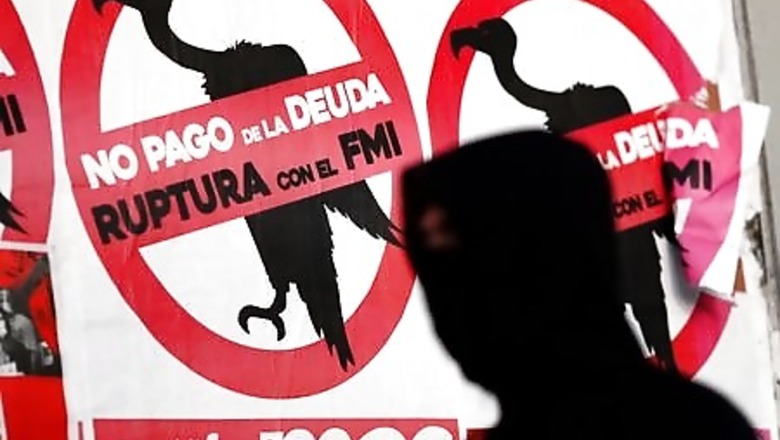
views
LONDON/BUENOS AIRES Argentina has reached an agreement with creditors to restructure around $65 billion in sovereign debt, breaking a deadlock in talks that will help the country climb out of default and banish fears of a damaging and protracted legal standoff.
The economy ministry said in a statement https://www.argentina.gob.ar/sites/default/files/press_release_roa_2.pdf on Tuesday it had reached an accord with major creditors after agreeing to adjust some payment dates and legal clauses to sweeten what had been touted as its “final” proposal made in early July.
A deal will help overwrite memories of Argentina’s last major default in 2001-2002, which led to over a decade of litigation and left it a pariah in global capital markets.
“Early this morning we finally reached an agreement and took a decisive step,” Economy Minister Martin Guzman said in an evening press conference, adding the deal was key to bringing the public sector out of a “situation of asphyxia.”
He said the deal had the backing of a majority of creditors, and Argentina would look to convince any still undecided.
A major grain producer and once one of the world’s wealthiest countries, Argentina fell into its ninth sovereign default in May and is headed for an estimated 12% economic contraction this year on the back of two years of recession.
The three creditor groups – the Ad Hoc Group, Argentina Creditor Committee and the Exchange Bondholder Group – said they were pleased to have reached an “agreement in principle” that provided debt relief and would lead to renewed access to international capital markets for Argentine issuers.
“The agreement is a good outcome for all participants and delivers an offer that all creditors should support,” they said.
The ministry said it would extend the deadline for creditors to formally accept the new deal to Aug. 24. It had been set to expire on Tuesday.
BOND MARKETS CHEER
The agreement helped lift sovereign bonds an average of 8.7% following a rally on Monday in anticipation of a deal.
The country had been at an impasse with creditors, which included big-name funds such as BlackRock and Ashmore, over revamping the debt.
Investors were cheered by the announcement of an agreement.
“It is something that the main bondholder groups can accept,” said Graham Stock, an emerging markets strategist at creditor BlueBay Asset Management, who said the average net present value of the new offer was 54.8 cents on the dollar.
“The economic situation in Argentina is very challenging and a key focus for us was to make sure there was sufficient cash flow relief for the government in the short-term to help the government address the economic fallout from coronavirus.”
Riccardo Grassi, risk manager at Mangart Capital Advisors, said the two sides had reached a “political compromise.”
“I wouldn’t say creditors are happy, but we are happy that this thing has been resolved,” he added.
Gabriel Torres at credit ratings agency Moody’s said the agreement would allow the country to avoid “protracted and costly legal proceedings with bondholders” and called for “credible and sustainable fiscal and monetary policies.”
PAYMENT DATES CHANGE
As part of the deal, the government said it would adjust some payment dates for the new bonds set out in the offer to raise the proposal’s value.
The offer will also adjust certain legal aspects of so-called collective action clauses (CACs), which determine how future changes can be made to bond agreements. These had become a key point of contention in the talks.
Some bondholders had feared Argentina would try to use the CACs to adopt a “Pac-Man” strategy of attempting to get them on board one at a time.
Carlos de Sousa of Oxford Economics said the changes and the accord with major creditors meant a deal was almost in the bag.
“It should be straight forward now to achieve the required qualified majorities for a successful debt exchange,” he said.
Under the deal, payment dates on the new bonds will be Jan. 9 and July 9, instead of March 4 and Sept. 4. The new bonds will begin amortizing in January 2025 and mature in July 2029.
Moderate Peronist President Alberto Fernandez and Guzman had been adamant that Argentina was unable to improve the offer made in early July, though people close to the talks said there could be wiggle room to sweeten the offer.
Argentina struck a $57 billion loan deal with the International Monetary Fund in 2018 and has said it will seek a new program with the fund after it wraps up its talks with private creditors.
“A very significant step. Look forward to a successful conclusion in the interest of all,” IMF head Kristalina Georgieva said in a congratulatory post on Twitter.
Disclaimer: This post has been auto-published from an agency feed without any modifications to the text and has not been reviewed by an editor















Comments
0 comment